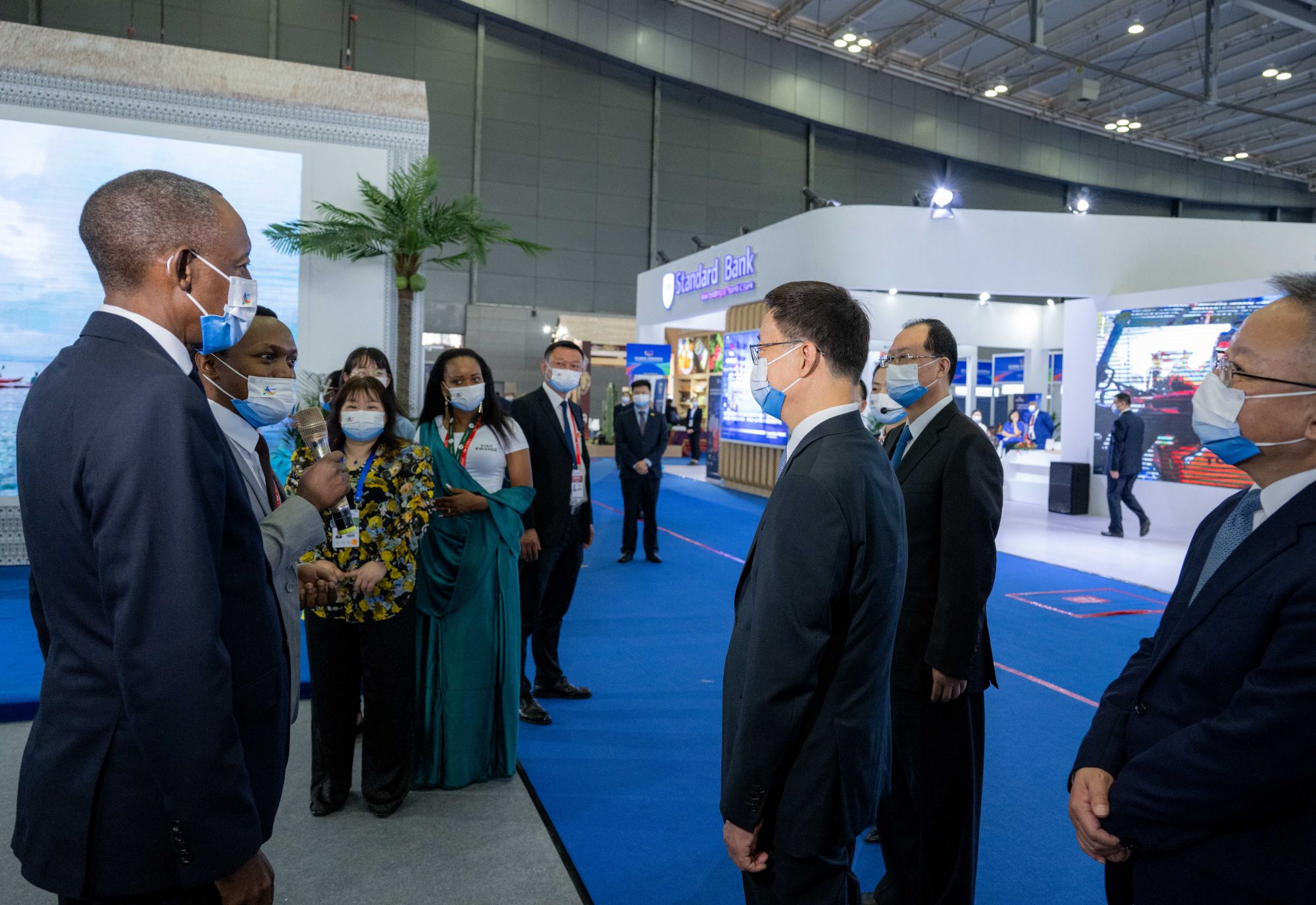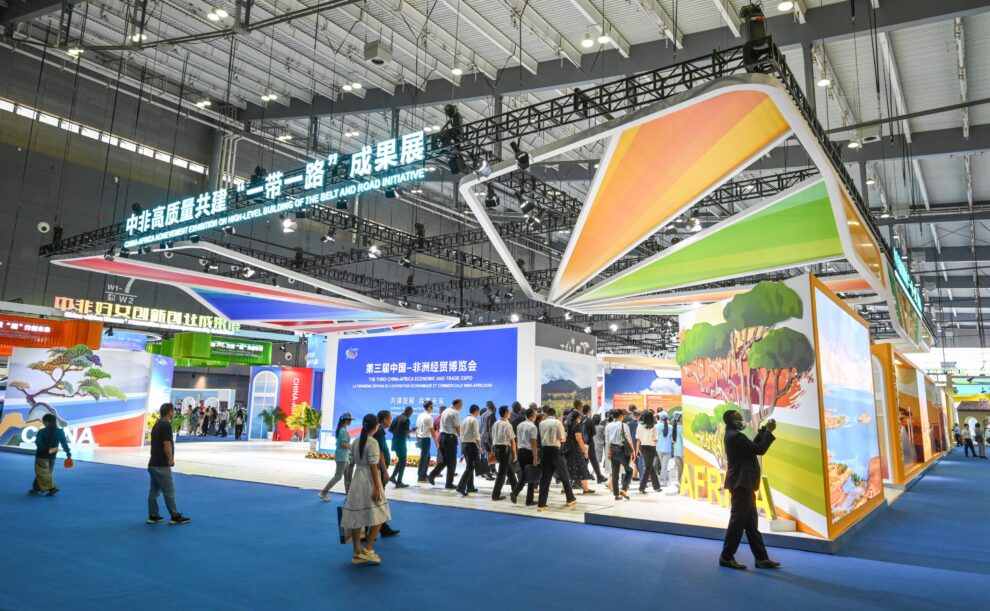A total of 120 deals worth US$10.3 billion were signed during the third China-Africa Economic and Trade Expo in Changsha, capital of the central Chinese province of Hunan – significantly lower than previous events.
Some 99 cooperation projects valued at US$8.7 billion were unveiled at the four-day event that ended on Sunday, Chinese officials said. Of these, 74 were matchmaking initiatives launched by 11 African countries.
According to the Hunan provincial government, 15 economic and trade cooperation agreements and projects worth US$3.48 billion were signed on the spot at the Deep Cooperation Pioneer Zone Project Negotiation Conference, an expo side event.
Among them was an agreement to develop the China-Africa cashew nut industry which could yield more than US$200 million in revenue in the next three to five years.
Under the terms of the deal, Hunan, Cereals, Oils and Foodstuffs Import and Export Group will import shelled cashews and other raw nut materials from Africa for processing, using its existing production capacity as well as the sales channels of its subsidiary Xiangfei International.
The company will also build supply chain infrastructure, including warehouses in Africa and strive to achieve revenue of more than 2 billion yuan (US$275 million) over three to five years.
At another expo side event – the China-Africa Infrastructure Cooperation Forum – 32 firms from China and Africa signed 19 agreements, valued at US$2.9 billion, covering transport, energy, communication, water conservancy, industry, and agriculture.
The projects included construction of the Republic of the Congo’s viaduct extension and the Tanger Tech Green Energy Park in Morocco.
The total fell short of initial estimates that the expo would generate US$19.1 billion worth of agreements, with their eventual value a drastic reduction on the previous two events.
The debut expo in 2019 attracted 84 cooperation projects worth US$20.8 billion, while 135 agreements worth US$22.9 billion were signed at the second event two years later.
This year’s expo attracted 53 African countries that have diplomatic ties with China. About 1,600 categories of goods from 29 African countries were on display, in response to an earlier promise by Beijing to allow more food products from Africa into the country.

Chinese Vice-President Han Zheng visits the exhibition hall before addressing the opening ceremony of the third China-Africa Economic and Trade Expo on Thursday. Photo: Xinhua
Chinese Vice-President Han Zheng opened the expo on Thursday with a pledge that China would deepen and solidify the pragmatic cooperation between the two sides.
“China is willing to provide new opportunities for Africa through Chinese modernisation and high-quality development,” he said.
Zhou Yixiang, Hunan’s deputy secretary general, said participation at this year’s event was the highest so far, with 1,700 overseas guests and more than 10,000 domestic visitors.
The visitor numbers show “the strong vitality and resilience of China-Africa economic and trade cooperation”, state news agency Xinhua quoted Zhou as saying.
At another expo side event, China and African countries agreed to establish a liaison mechanism for sanitary and phytosanitary approvals that have been a stumbling block to imports of agricultural food products from Africa.
Wang Lingjun, deputy director of China’s General Administration of Customs, signed market access agreements with representatives from Madagascar and Zimbabwe to enable their food and agricultural products to enter China.
“China will continue to expand the types of African agricultural and food products exported to China,” he said.
In a statement, the provincial government said: “Hunan will give full play to its advantages in market, e-commerce and innovation, to energise consumption, strengthen trade ties with Africa and promote trade between Hunan and African countries.”
Chinese customs data shows the volume of agricultural imports and exports between China and Africa increased from 33.3 billion yuan in 2012 to 58.6 billion yuan in 2022.
The expanded trade – which includes imports of African aquatic products, honey, sesame, peanuts, tobacco, wool, cotton, soybeans, coffee and fruit – follows the signing of dozens of agreements with countries in Africa to boost their access to Chinese markets.
Among the specialty African products on display at the expo were wines, black and rooibos teas, coffee beans, roses and handicrafts. China-made construction machinery, medical instruments, household goods and agricultural equipment were also on display.
Also featured was the first batch of wild anchovy products from Kenya – with 27 boxes of the dried fish airlifted to China by Hunan Jinzai Food Group from its Kenyan factory, built in 2018.
The anchovies’ arrival in Hunan is part of China’s elaborate plan to use the landlocked province as a model for the growth of China-Africa trade while increasing imports of African food and agricultural products.
Beijing has positioned Hunan as a test field for Chinese President Xi Jinping’s 2021 pledge to open “green lanes” with Africa and improve the trade balance by importing more African agricultural products.
The biennial expo in the province is one of the initiatives introduced to grow trade with the continent and offset the dominance of metals and raw materials in China-Africa trade.
China has 21 pilot free-trade zones, but the one in Hunan is specifically charged with building a “demonstrative highland” of cooperation with Africa. The province is now home to the African Non-Resource Products Trade Centre and the China-Africa Cross-Border RMB Centre.
The choice of Hunan is likely to be because of its complementary industries with Africa and historical agricultural connections with the continent.
The province is China’s own ancient food bowl and home to the 20th century green revolution that transformed rice production. The technology, invented by Yuan Longping – the “father of hybrid rice” – has been exported to 20 African countries, including Madagascar and Burundi.
Hunan has also expanded its trade routes with the continent, with a combined rail-sea transport channel reaching 11 hub seaports in Africa and connecting with 20 inland road and rail networks.
“This is the country’s first rail-sea combined transport channel that features docking with Africa, and the transport time to the basic port in East Africa is 10 days shorter than that of river-sea combined transport,” the Hunan government said.
China-Africa expert Lauren Johnston said Beijing’s logic in locating its efforts in Hunan may relate to complementarities between development hurdles in Africa and the province’s established industrial advantages.
Hunan’s role within China had a history and importance akin to the Nile Basin in Egypt and Sudan, in terms of agricultural outputs and food security, she said, in a forthcoming study by the South African Institute of International Affairs.
The province’s advantages included agritech and construction equipment industries that were competitive internationally, Johnston said.
“The embedded agenda to invest in agricultural productivity and food security in Africa, alongside elevated agricultural exports to China, with early focus on avocados, has a focus on e-commerce-based and local currency-based trade,” she said.
Hunan Communist Party secretary Shen Xiaoming said the province had been chosen to host national-level platforms such as the expo and the pilot zone for in-depth China-Africa economic and trade cooperation.
“They have contributed to closer exchanges and cooperation between Hunan and Malawi,” he said at the opening of Malawi’s consulate in Changsha on Thursday.
Shen said Hunan was implementing Xi’s important instructions to the province, “actively serving China’s strategy of opening up to the outside world, and striving to develop Hunan into a new hub for economic and trade cooperation with African countries”.
Source : South China Morning Post











